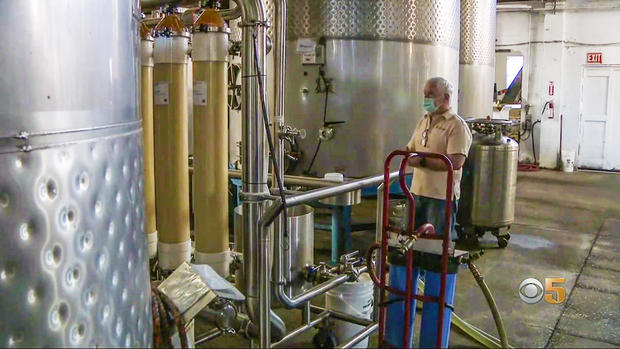Small Winery Operators Fear New California Wastewater Rules Will Cork Profits
SEBASTOPOL (KPIX) -- California regulators have approved a new set of statewide rules for wastewater discharged from wineries and some smaller operators in the North Bay are saying the new requirements could put them out of business.
When Taft Street Winery in Sebastopol makes wine it uses lots of water to keep the equipment clean and sanitary. That water is collected in holding ponds which were previously regulated by individual county water boards.
But large wineries which operate in multiple counties complained that was too complicated.
"So, there was an effort to say, 'let's have statewide wastewater discharge requirements and that's going to make it simpler,'" said Taft Street co-owner Mike Martini. "Well, first of all, if the government tells you they're going to make it simpler, that's not true."
The new statewide rules will require discharge reporting, create standards for treatment systems and ponds and mandate groundwater monitoring for large wineries.
Those large wineries may be able to afford the new "water discharge requirements" (WDRs) but Martini says smaller places like Taft Street can't.
"Taft Street generates about $2 million a year in revenue," he said. "For complete compliance with this WDR, the engineers are telling me it's about a half a million dollars for us."
Martini fears that might be enough to put some smaller-size operations out of business.
Don McEnhill, executive director of the eco-protection group Russian Riverkeeper, says the new rules would also require wineries to evaluate their operations for the potential of other kinds of spills, such as the one last year when a tank at Rodney Strong winery burst, sending nearly 100,000 gallons of wine into Reiman Creek and on into the Russian River.
"When you're making wine, everything involved in the process is considered wastewater if it ends up potentially spilling out of your tank and going on the ground," McEnhill explained. "That's what the plan is all about, thinking through 'what if?'"
But Martini says winemakers are already committed to protecting the environment and he wonders if regulators are asking themselves "what if" the new statewide rules end up sending smaller wineries down the drain?
The state is giving wineries up to eight years to comply with the rules which would only affect wineries producing more than 10,000 gallons of wastewater per year. Those creating less would be exempt.




